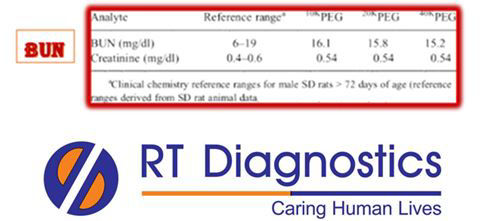UREA:
UREA TEST – BUN (Blood Urea Nitrogen)
UREA NITROGEN - BUN (Blood Urea Nitrogen): Urea is a final breakdown end product of protein formed by the liver. This end product will be filtered by the nephrons of the Kidneys and eliminated in the urine. BUN level varies due to the diseases and/or disorders of the liver and/or kidneys. Urea test helps to evaluate the functioning of kidneys and monitoring of dialysis during prognosis.
CLINICAL INFORMATION :
The normal kidneys can eliminate the urea from the blood efficiently, while if the kidneys are not functioning well up to their optimal levels then the BUN level rises in the blood. These levels can also increase in certain disorders and diseases such as heart failure, dehydration, or high protein diets and/or liver damage can also give false-positive test results, hence further investigations such as renal function test or kidney biopsy confirm the conditions of the kidneys.
This test is usually done for altered levels of BUN in the blood reflects the pathology of the kidney which prevents their normal excretory functions. This test is suggested in patients with symptoms of acute or chronic kidney failure due to underlying pathologies. Other associated tests include a kit method, colorimetric, spectrometric methods, etc.

General instructions:
Sample Requirement: Specimen - Blood sample drawn from the vein. Test Preparation: None.
NOTE - Sample for specimen collections may vary based on the patient’s condition/cases according to the patient’s presenting complaints/signs or symptoms:
SPECIMEN REQUIREMENT (Special or Rare Cases) - As instructed and guided by Physician / Clinician / Pathologist / as per Laboratory’s requirements, according to procedures and protocols.
This Multi-Specialty Clinical Referral Laboratory “RTDIAGNOSTICS” provides precise and accurate tests with an extensive range of testing services to the medical centers to help in the diagnosis and identification of pathology in the test specimens for infectious diseases and also to evaluate the function of organ systems of the patient. It prevents further complications and helps to stabilize and restore health to near normalcy at the earliest without delay.



